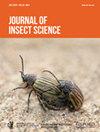Social conditions facilitate water conservation in a solitary bee
IF 2.1
3区 农林科学
Q1 ENTOMOLOGY
引用次数: 0
Abstract
Climatic stressors are important drivers in the evolution of social behavior. Social animals tend to thrive in harsh and unpredictable environments, yet the precise benefits driving these patterns are often unclear. Here, we explore water conservation in forced associations of a solitary bee (Melissodes tepidus timberlakei Cockerell, 1926) to test the hypothesis that grouping can generate synergistic physiological benefits in an incipient social context. Paired bees displayed mutual tolerance and experienced reduced water loss relative to singleton bees when exposed to acute low-humidity stress, with no change in activity levels. While the mechanism underlying these benefits remains unknown, social advantages like these can facilitate the evolution of cooperation among nonrelatives and offer important insights into the social consequences of climate change.社会条件有利于独居蜜蜂节约用水
气候压力是社会行为进化的重要驱动力。社会性动物倾向于在严酷和不可预测的环境中茁壮成长,但驱动这些模式的确切益处往往并不清楚。在这里,我们探讨了独居蜜蜂(Melissodes tepidus timberlakei Cockerell,1926 年)被迫结伴时的节水问题,以验证这样一个假设,即在社会环境萌芽期,结群可以产生协同生理效益。与单只蜜蜂相比,配对蜜蜂在暴露于急性低湿胁迫时表现出相互耐受性并减少了水分流失,但活动水平没有变化。虽然这些益处的内在机制尚不清楚,但像这样的社会优势可以促进非亲属间合作的进化,并为气候变化的社会后果提供重要的启示。
本文章由计算机程序翻译,如有差异,请以英文原文为准。
求助全文
约1分钟内获得全文
求助全文
来源期刊

Journal of Insect Science
生物-昆虫学
CiteScore
3.70
自引率
0.00%
发文量
80
审稿时长
7.5 months
期刊介绍:
The Journal of Insect Science was founded with support from the University of Arizona library in 2001 by Dr. Henry Hagedorn, who served as editor-in-chief until his death in January 2014. The Entomological Society of America was very pleased to add the Journal of Insect Science to its publishing portfolio in 2014. The fully open access journal publishes papers in all aspects of the biology of insects and other arthropods from the molecular to the ecological, and their agricultural and medical impact.
 求助内容:
求助内容: 应助结果提醒方式:
应助结果提醒方式:


